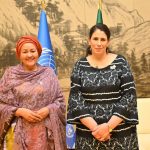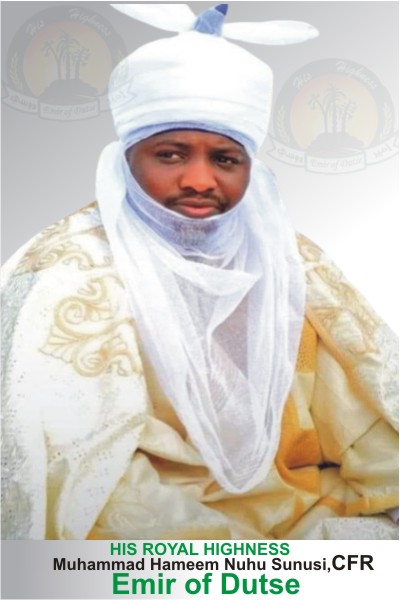A Tale of Unity and Leadership in Jigawa and Kano: The Turbaning of Two Visionary Leaders.
By Bala Salihu Dawakin kudu
Northern Bureau Chief.
December 15, 2024
In a remarkable display of tradition and leadership, the Emir of Dutse, Alhaji Muhammad Nuhu, recently turbaned Alhaji Abubakar Sule Lamido as the new Kaigaman Dutse and District Head of Bamaina. The event, held at the Emir’s grand palace, was not just a ceremonial occasion, but a testament to the enduring value of wisdom, integrity, and community service. With a crowd gathered to witness the ceremony, Lamido, a distinguished figure known for his deep commitment to the welfare of the people, received the traditional turban and the prestigious letter of appointment.
In his speech, the Emir expressed immense pride in Lamido’s character, highlighting his unwavering dedication to the palace and the community. The Emir emphasized that Lamido’s selection was not just based on his strong educational background—both religious and modern—but also on his demonstrated loyalty to the betterment of the people. He urged the new Kaigaman Dutse to apply these qualities in his new role, ensuring peace and prosperity for Bamaina and the greater Jigawa State.
With the endorsement of the Emirate Council and approval from Governor Malam Umar Namadi, Lamido’s appointment was a powerful symbol of trust and responsibility. The Emir, speaking through the Galadima of Dutse, Alhaji Basiru Muhammad Sunusi, reiterated the importance of Lamido’s role, especially in managing the Zakka, which is vital to the community’s well-being. The Emir’s words reflected confidence in Lamido’s ability to govern with fairness and integrity, bringing much-needed development to Bamaina.
In his acceptance speech, Lamido humbly thanked the Emir, the governor, and the Emirate Council for the honor and trust bestowed upon him. He vowed to dedicate himself fully to the role, promising to work tirelessly to improve the lives of the people of Bamaina. Lamido’s words were filled with a sense of duty, as he committed to prioritizing peace, social welfare, and economic development in his district.
In a parallel event that showcased a deep commitment to community progress, the Emir of Rano, Ambassador Dr. Muhammad Isa Umaru, officially turbaned Alhaji Ahmad Ado Kibiya as the new Village Head of Kibiya. The ceremony, held in the bustling Emir’s palace of Rano, brought together a mix of dignitaries, community leaders, and residents to celebrate the historic appointment. The occasion marked a new chapter for Kibiya, as the community embraced its new leader with excitement and hope.
Kibiya, under the guidance of its new Village Head, had seen a significant transformation. Ahmad Ado Kibiya, an experienced administrator and former Chairman of Rano Local Government, succeeded his elder brother, Senator U.K. Umar, who was recently appointed as the District Head (Durbin Rano). The decision to appoint Ahmad Ado Kibiya was met with resounding approval from influential stakeholders, including ward heads and imams, who praised his dedication to public service and leadership.
In his address, the Emir of Rano emphasized the importance of unity, inclusivity, and development, urging Ahmad Ado Kibiya to continue fostering collaboration with all stakeholders to ensure the progress of Kibiya and the wider Rano Emirate. The Emir’s message was clear: the role of the Village Head was not merely administrative, but a commitment to the social, economic, and spiritual growth of the community. He urged Kibiya’s new leader to continue his work of forging strong bonds among the people, ensuring that every voice was heard and every citizen benefited from the leadership’s progress.
Ahmad Ado Kibiya, deeply moved by the trust placed in him, expressed his profound gratitude to the Emir and the people of Kibiya. In his acceptance speech, he emphasized his dedication to fostering social harmony, improving educational opportunities, and driving economic development. With a deep sense of responsibility, Kibiya pledged to bring positive change to Kibiya, ensuring that the community flourished in all aspects of life.
The ceremony, which drew well-wishers from across Jigawa and Kano states, reflected the unity and pride of the people. Family, friends, and community members gathered to witness the event, marking it as a historic moment for Kibiya. The sense of hope and renewal that permeated the air signified a shared vision of progress and prosperity for the future.
As both Lamido and Kibiya took on their new roles, the turbaning ceremonies of these two exceptional leaders symbolized more than just the passing of authority; they were a reflection of the enduring strength of leadership rooted in tradition, service, and the desire for positive change. Through these two appointments, the people of Jigawa and Kano States saw the birth of a new era—one driven by leaders who are committed to building better communities for generations to come. The legacy of these appointments will undoubtedly shape the future of both Bamaina and Kibiya, leaving an indelible mark on the history of their people.












